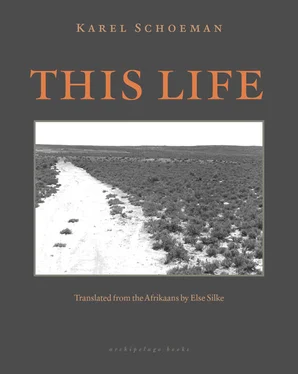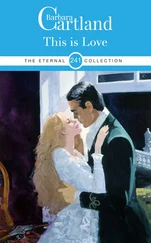Karel Schoeman - This Life
Здесь есть возможность читать онлайн «Karel Schoeman - This Life» весь текст электронной книги совершенно бесплатно (целиком полную версию без сокращений). В некоторых случаях можно слушать аудио, скачать через торрент в формате fb2 и присутствует краткое содержание. Год выпуска: 2015, ISBN: 2015, Издательство: Archipelago, Жанр: Современная проза, на английском языке. Описание произведения, (предисловие) а так же отзывы посетителей доступны на портале библиотеки ЛибКат.
- Название:This Life
- Автор:
- Издательство:Archipelago
- Жанр:
- Год:2015
- ISBN:978-0-914671-16-9
- Рейтинг книги:5 / 5. Голосов: 1
-
Избранное:Добавить в избранное
- Отзывы:
-
Ваша оценка:
- 100
- 1
- 2
- 3
- 4
- 5
This Life: краткое содержание, описание и аннотация
Предлагаем к чтению аннотацию, описание, краткое содержание или предисловие (зависит от того, что написал сам автор книги «This Life»). Если вы не нашли необходимую информацию о книге — напишите в комментариях, мы постараемся отыскать её.
considers both the past and future of the Afrikaner people through four generations of one family. In an elegiac narrator's tone, there is also a sense of compulsion in the narrator's attempts to understand the past and achieve reconciliation in the present. This Life is a powerful story partly of suffering and partly of reflection.
This Life — читать онлайн бесплатно полную книгу (весь текст) целиком
Ниже представлен текст книги, разбитый по страницам. Система сохранения места последней прочитанной страницы, позволяет с удобством читать онлайн бесплатно книгу «This Life», без необходимости каждый раз заново искать на чём Вы остановились. Поставьте закладку, и сможете в любой момент перейти на страницу, на которой закончили чтение.
Интервал:
Закладка:
Mother, of course, provided no explanation, but one day she told us to make the bed in the outside room, the room where Pieter used to sleep, for since his departure no one had been allowed to use it, and Coenraad, as I have said, bedded down in the shed; and Pieter moved in there. Mother silently unpicked the seams of Father’s old suit and cut the pieces smaller, and wordlessly she remade it for Pieter to wear, for Father had always been a sturdy man, and Pieter was thinner than ever. Thus he was given clothes to wear, and a few skin-blankets, a razor and an enamel basin, for he had brought nothing with him, and he joined us for meals as if he had never been away.
If I peer into the darkness long enough, if with my meager remaining strength I struggle up against the pillows, craning my neck, I can almost make out in the darkness the window outlined against the first grey light that filters through the chink between sash and shutter. The memory of first light and daybreak penetrates the dark and is burned into the retina, and amid the absolute silence of the surrounding night, amid the rush of blood in my ears and the slow rattling of my own breath, I imagine that I hear the distant crowing of a cock. The girl on the cot at the foot of my bed stirs sleepily, the first movement in the long stagnant night, and gropes on the floor for her shoes, searches for the matches to light the candle, and for a moment I am bewildered by the sudden brightness of the flame; I, who have learned to see in the dark, am blinded by the light. The long night which has held me captive is over, and I am delivered from the relentless thoughts I cannot control and the memories I cannot evade, relieved of the obligation to repeat what I do not want to remember and to relive what I have forced myself to forget. Pieter came back. Pieter is dead, that is all; that is enough. I hear the women chattering in the kitchen as they light the fire and boil water, they come and bend over my bed and, as I lie helpless in their hands, I continue to cling to their words, their gestures and their dutiful care that promise me deliverance. Pieter is dead and rests in the graveyard beyond the ridge and in a few months, a few weeks, who knows how soon, perhaps even tomorrow, I, too, will be borne there along the narrow, rocky footpath, and it will be over. I do not want to remember. If only I can hold out long enough, I shall be safe.
But not yet. The night preserves its darkness and in the silence beyond this room there is no sound: helpless I lie here, surrendered to the night, and I cannot evade the reckoning demanded of me. The bright light burns into the retina and I see the house with Mother waiting outside, her shadow under her feet, and the black cart, and Father being helped out carefully, painfully. That is how Pieter returned.
No, not like that, not quite like that; there is more that I remember and can tell, more that I must tell. The morning comes to life before my eyes and the brightness burns in the dark, and I hear Mother calling for help. Who held the horses, who supported Father as he dismounted? Our attention was focused on him, on helping and welcoming him and bringing him into the voorhuis; we had already begun to move towards the house, our shadows under our feet, when he made a half-turn as if to give a further instruction about the horses, and we paused and turned around too. That was how Pieter returned to us. With our hands shielding our eyes against the brilliance of the sun we looked around and noticed a passenger under the hood of the cart. “Come, Pieter,” Father coaxed gently as if addressing a child, and the figure in the cart stirred, ducked his head and climbed out.
Why must I remember, why must I be forced to remember here at the end of my life? In the end it was good, the way my life continued all those years, the unmarried daughter, the spinster aunt, on the farm and in our town house, between Roggeveld and Karoo, always present in the background and always prepared to help and serve where necessary. It was good the way it was and good the way it ended after all those years; if a service should be held at the graveside, the minister would readily find appropriate words and texts to sum up my life, and if a headstone should be erected for me, the dates of birth and death would suffice to review the course of more than seventy years. I have forgotten the treachery and the loss, I have forgotten how Pieter left and came back. Why must I remember now?
In the shade under the hood a figure rose hesitantly and, blinded by the sun’s glare, we shielded our eyes with our hands and saw the passenger who had been sitting next to Father climb down slowly and step into the light, and we did not realise at once that it was Pieter who had returned to us.
Pieter, yes. Mother might have been expecting him, but I had not known. Pieter, I say now, but at the same time I do not know why I should have thought that. A stranger stood next to the cart, a man with shabby, oversized clothing and worn shoes, head bowed and eyes fixed on the ground as though waiting for further instructions: it was only because Father had spoken that familiar name after all the years that I knew it had to be him and that he had returned, that he had returned at last. “This is your mother,” Father told him in that same gentle voice, and Mother went to him and embraced him. He endured the embrace passively, showing no sign of recognition, but because Father was looking at me expectantly, I went up to the man too and put my arms around him briefly and kissed my brother, kissed Pieter. He was back. It is enough, more than this I need not remember.
What did they tell people? Some explanation must have been given, convincing or not, credible or not, true or not, but not in my presence; Father and Mother never mentioned Pieter’s return to me, neither was the subject ever broached by others. Of course people talked, however, and the pretexts, the lies, the rumours and the speculation gave rise to a kind of legend which in time reached even my ears. Much later, when Father and Mother were both dead, the conversation once turned to the diamond diggings, and Herklaas Vlok mentioned something to Maans in passing about “your Uncle Pieter there at Barkly West”. Later still, Stienie once mentioned poor Uncle Pieter who had suffered so much on the Diamond Fields. Perhaps that was what she had been told, and she had believed it to be the truth; only it was not true, and could not have been true, for diamonds were discovered at the Vaal River only after Pieter’s return, around the time of Father’s death, when Coenraad left for the diggings and Maans also spoke of going. When Pieter came back, there was no question of diamonds, and Coenraad was still with us and Maans was at school in Worcester. At the time of Stienie’s remark, it had all happened so long ago that the legend must have gained credibility, but Herklaas Vlok was my age and should have known the sequence of events; why would he tell such a muddled tale? I often pondered on these matters and wondered how much was fact and how much fiction and on how much truth the legend was based, how far they had wandered into Bushmanland or Namaqualand in the direction of Groot River, before a stranger near Hopetown dispatched his servant to fetch Father; but long before Pieter’s death I stopped puzzling about these things, for I realised there was no sense in it. What was important was that Pieter had come back; and he had come alone, and he had come like that.
After his return he moved into the outside room again where he used to sleep after Jakob’s marriage. He took his meals with us and was present at family prayers, but he never entered the house otherwise, neither was he summoned when guests arrived; he was bashful when strangers joined us at mealtimes, and very soon we got into the habit of sending his food to his room on such occasions. When we went to town, he attended church services with us, but there he slept in the outside room as well and avoided the house when there were visitors. The children sometimes shouted after him in the street, teasing him, but eventually people accepted him the way he was, for he bothered no one. When he was asked a question, an ordinary, everyday question about the things he knew, he answered readily, but for the rest it was often as if he did not quite understand what was being said, and he never initiated any conversation himself. Sometimes, however, it was as if he had completely forgotten where he was and he would just sit, staring dully into the distance, and then Father would touch him and speak to him gently. After Father’s death Maans continued to do this, for Maans also had a great deal of patience with him, but by that time it no longer happened so often, for in time he became accustomed to us again and our routines were not so strange to him any more. He knew the members of our family and called us by our names, but there was never any recognition, nor did he ever show any awareness of the past he had left behind years ago; every day he seemed anew like a stranger, or a visitor arriving with us for the first time.
Читать дальшеИнтервал:
Закладка:
Похожие книги на «This Life»
Представляем Вашему вниманию похожие книги на «This Life» списком для выбора. Мы отобрали схожую по названию и смыслу литературу в надежде предоставить читателям больше вариантов отыскать новые, интересные, ещё непрочитанные произведения.
Обсуждение, отзывы о книге «This Life» и просто собственные мнения читателей. Оставьте ваши комментарии, напишите, что Вы думаете о произведении, его смысле или главных героях. Укажите что конкретно понравилось, а что нет, и почему Вы так считаете.












